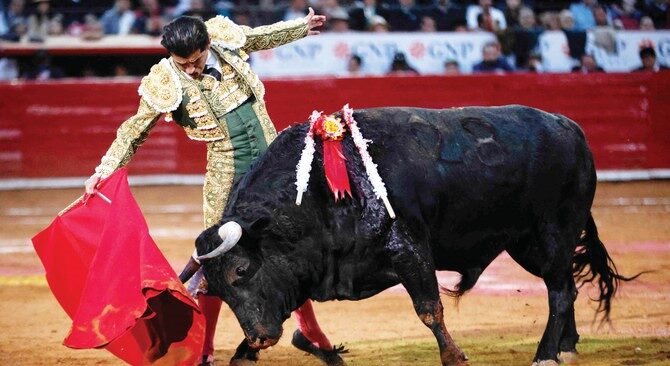MEXICO CITY: Cheering spectators filled Mexico City’s massive bullfighting arena on Sunday, taking in the capital’s first bloody show since the Supreme Court last month overturned an earlier suspension, as protesters outside the stadium demanded a permanent ban.
Inscribed in the dirt of Mexico’s Monumental Plaza de Toros — the largest bullfighting stadium in the world, with seating for over 41,000 — was the phrase: “Freedom. Bulls, living culture.”
Trampled by the charging bulls and side-stepping matadors, the message slowly faded through the evening.
Sunday’s event, which featured famed Mexican bullfighter Joselito Adame, was the first since a judge in June 2022 ordered an indefinite suspension of the centuries-old practice in Mexico City, agreeing with animal rights activists who had filed suit.
“I’m very moved, it’s something I’ve been waiting a long time for,” spectator Alejandra Diaz, a 49-year-old educator, told AFP, stressing the “importance of bullfighting culture.”
Police outside the stadium blocked protesters, some wearing bull masks and covered in blood-red paint, from entering.
Dozens of people had earlier gathered at the central Glorieta de Insurgentes roundabout before marching to the bullring under the banner “Torture is neither art nor culture.”
“It’s important to be here because they’re going to resume their barbarity, their cruelty, their massacre. It must not happen, and we have to send them a pretty clear message,” 62-year-old protester Gabriela Martinez told with tears in her eyes.
“We are completely against the fact bullfights have returned, and that these events continue to be held where only pleasure is sought through the torture of an animal,” Jeronimo Sanchez, director of the NGO Animal Heroes said.
After the high court’s decision, President Andres Manuel Lopez Obrador raised the possibility of a referendum on the future of bullfighting in Mexico City.
Four of Mexico’s 32 states have already banned the practice, which according to its supporters generated millions in revenues and employed around 80,000 people in 2018.


